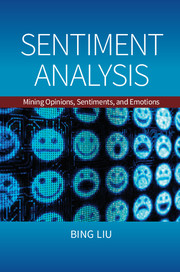Book contents
- Frontmatter
- Contents
- Preface
- Acknowledgments
- 1 Introduction
- 2 The Problem of Sentiment Analysis
- 3 Document Sentiment Classification
- 4 Sentence Subjectivity and Sentiment Classification
- 5 Aspect Sentiment Classification
- 6 Aspect and Entity Extraction
- 7 Sentiment Lexicon Generation
- 8 Analysis of Comparative Opinions
- 9 Opinion Summarization and Search
- 10 Analysis of Debates and Comments
- 11 Mining Intentions
- 12 Detecting Fake or Deceptive Opinions
- 13 Quality of Reviews
- 14 Conclusions
- Appendix
- Bibliography
- Index
8 - Analysis of Comparative Opinions
Published online by Cambridge University Press: 05 June 2015
- Frontmatter
- Contents
- Preface
- Acknowledgments
- 1 Introduction
- 2 The Problem of Sentiment Analysis
- 3 Document Sentiment Classification
- 4 Sentence Subjectivity and Sentiment Classification
- 5 Aspect Sentiment Classification
- 6 Aspect and Entity Extraction
- 7 Sentiment Lexicon Generation
- 8 Analysis of Comparative Opinions
- 9 Opinion Summarization and Search
- 10 Analysis of Debates and Comments
- 11 Mining Intentions
- 12 Detecting Fake or Deceptive Opinions
- 13 Quality of Reviews
- 14 Conclusions
- Appendix
- Bibliography
- Index
Summary
Apart from directly expressing positive or negative opinions about an entity and/or its aspects, one can also express opinions by comparing similar entities. Such opinions are called comparative opinions (Jindal and Liu, 2006a, 2006b). Comparative opinions have different semantic meanings than regular opinions and also different syntactic forms. For example, a typical regular opinion sentence is “The voice quality of this phone is amazing,” and a typical comparative opinion sentence is “The voice quality of Moto X is better than that of iPhone 5.” This comparative sentence does not say that any phone's voice quality is good or bad, but simply states a relative ordering in terms of voice quality of the two smart phones. Like regular sentences, comparative sentences can be opinionated or not-opinionated. The above comparative sentence is clearly opinionated because it explicitly expresses a comparative sentiment, while the sentence “Samsung Galaxy 4 is larger than iPhone 5” expresses no sentiment, at least not explicitly. In this chapter, we first define the problem of comparative opinion mining and then present some existing methods for solving the problem. We will study superlative opinions as well because their semantic meanings and handling methods are similar.
Problem Definition
A comparative sentence usually expresses a relation based on the similarities or differences of more than one entity. Linguists have studied comparatives in the English language for a long time. Lerner and Pinkal (1992) defined comparatives as universal quantifiers over degrees. For example, in the sentence “John is taller than he was,” the degree d is John's height and John is tall to degree d. In other words, comparatives are used to express explicit orderings between objects with respect to the degree or amount to which they possess some gradable property (Kennedy, 2005). Two broad types of comparatives are as follows:
Metalinguistic comparatives. Compare the extent to which an entity has one property to a greater or lesser extent than another property, for example, “Ronaldo is angrier than upset.”
[…]
- Type
- Chapter
- Information
- Sentiment AnalysisMining Opinions, Sentiments, and Emotions, pp. 202 - 217Publisher: Cambridge University PressPrint publication year: 2015



